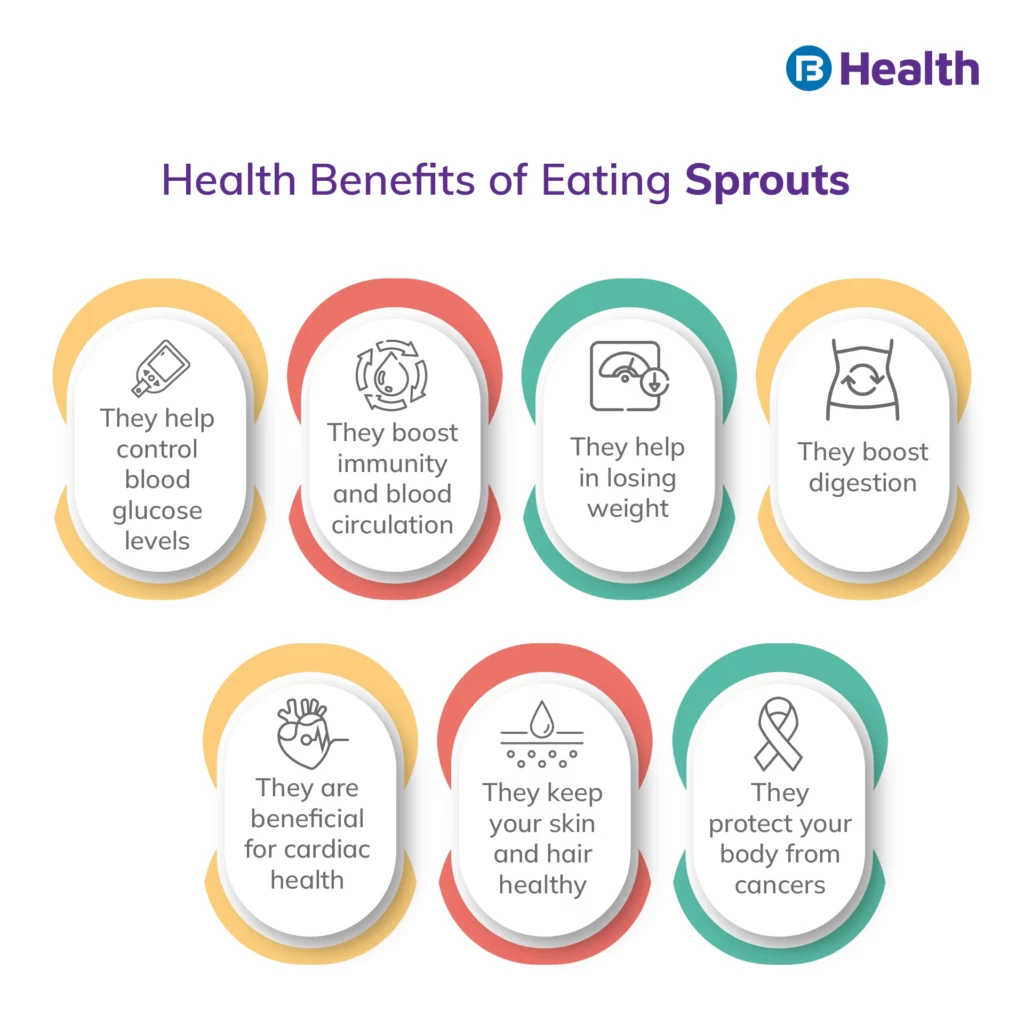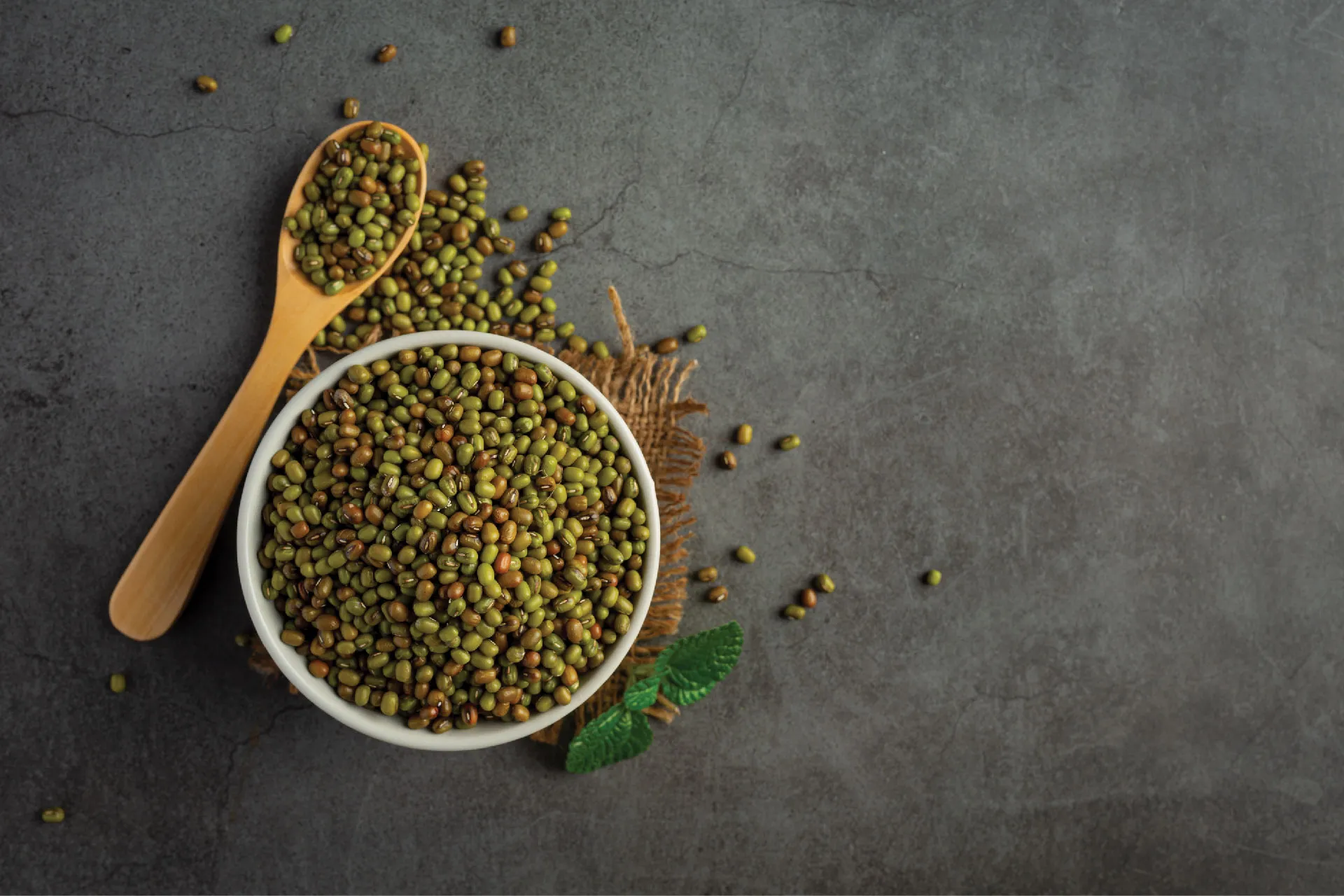Nutrition | 5 min read
Sprouts’ Benefits: 4 Key Things You Need to Know About Them
Medically reviewed by
Table of Content
Synopsis
Sprouts’ benefits are limitless as they are a powerhouse of nutrition. Find out about sprouts’ nutritional value and how you can benefit from sprouts’ nutrition.
Key Takeaways
- Sprouts are loaded with multiple nutrients like protein and vitamins
- Improved digestive health is one of the sprouts’ benefits
- Sprouts also boost immunity and blood circulation
Sprouts are popular as a powerful source of nutrition. In addition, you can get multiple sprouts benefits, such as improvement in digestion, lowering of blood sugar levels, protection from cardiac diseases, and more. Read on to learn about the different types of sprouts and their potential benefits.
What are sprouts?
Young plants which have just been germinated from seeds are called sprouts. Seeds are soaked to grow sprouts and then left in an environment with ideal temperature and moisture for sprouts to germinate. Usually, it takes 2-7 days for sprouts to come into shape. Their lengths tend to remain between 2-5 cm. Sprouts are popular as raw foods. However, you can also lightly cook them before consumption. Now, take a look at the different types of sprouts you can find in the market.
| Sprouted grains | Beans and peas | Seeds and nuts | Leafy greens |
| Buckwheat, brown rice, kmut, oat, amaranth and quinoa sprouts | Garbanzo, mung bean, soybean, lentil, kidney bean, black bean, snow pea and green pea sprouts | Sunflower seed, sesame seed, pumpkin seed, alfalfa seed, radish seed and almond sprouts | Beet, clover, radish, mustard green, fenugreek, broccoli and cress sprouts |
Do sprouts have more protein than regular dal?
The high protein content is one of the top sprouts benefits. A 2015 study conducted while sprouting cowpea at 25°C noted the following findings after 24 hours:
- 9-12% increase in the sprouts’ protein content
- 4-38 times increase in the amount of vitamin C
- 8-20% increase in in-vitro digestibility [1]
Another 2017 study found that protein content in sprouted pulses is higher than in other sources. Chickpea sprouts were found to have the highest nutritional value due to a large amount of protein [2]. All these studies support the fact that sprouts have more protein than regular dal.
Additional Read: 7 Amazing Sprout Health Benefits
Sprouts’ nutritional value
Sprouts are loaded with essential nutrients such as vitamins C and K, manganese, magnesium, folate, phosphorous, and protein. In addition, sprouts' nutrition sources also include high amounts of essential amino acids. Now, take a look at the following example.
Nutrition value of one cup of mung bean sprouts:
- Carbohydrates: 6 g
- Fat: 0 g
- Fibre: 2g
- Protein: 3 g
Note that here one cup stands for 31 calories.
Health benefits of eating sprouts
Consuming high-protein sprouts benefits our health in multiple ways. Take a look at the major sprouts’ benefits.
They help control blood glucose levels
A few theories argue that the sprouting of seeds boosts the number of carbs [3]. Another study suggests that high-protein sprouts help control the function of the amylase enzyme, which the body utilizes to disintegrate and digest sugar [4].
They boost immunity and blood circulation
Sprouts contain essential vitamins and minerals in sufficient amount, which contribute to RBC production in the body, boost blood flow, and ensures the supply of oxygenated blood to major organs. The presence of a large amount of vitamin C and antioxidants in germinated sprouts benefits our health by producing more WBC and boosting immunity.
They help in losing weight
Eating sprouts for weight loss is one of the major sprouts’ benefits. As they are low in calories, people who are keeping a check on their weight often have them in the form of snacks. Apart from this, fibres in sprouted grains help us feel full for a long time and control the release of the hunger hormone ghrelin. Thus, sprouts such as fenugreek seeds and mung bean are healthy foods for weight loss.
They boost digestion
One of the key sprouts’ benefits is their role in promoting digestion. As per research, fibres in seeds rapidly increase while sprouting. Sprouts usually boost the number of insoluble fibres responsible for the formation of stool and its movement through the gut. Thus, with sprouts, you can keep gut health issues like constipation at bay. Apart from this, sprouts reduce the amount of gluten in grains. If you have gluten sensitivity, sprouts can become your preferred meal.
They are beneficial for cardiac health
Multiple studies have shown that the consumption of sprouts can boost HDL (good) cholesterol and reduce total and LDL (bad) cholesterol in animals and humans. As cholesterol is directly linked to cardiac health, you can add some sprouts to your diet to maintain both.
They keep your skin and hair healthy
Vitamins A and C and antioxidants in sprouts are extremely beneficial for your hair and skin. While vitamin A boosts hair growth and regenerates skin cells, zinc helps maintain the sebum levels in your scalp.
They protect your body from cancers
Sprouting contains a core enzyme named glucoraphanin in large amounts and acts as a shield from different types of cancers.
Additional Read: Broccoli: Nutrition, Health Benefits, How to Eat
Conclusion
Now that you know about major sprouts benefits, feel free to add them to your high-protein diet. Take protein-rich food in the form of sprouting as part of your diet plan for weight loss and other health benefits. For detailed advice regarding your diet plan, go for an online doctor consultation on Bajaj Finserv Health. After consultation with a general physician, you can conveniently take a step towards healthy eating for your overall well-being!
FAQs
How many sprouts should you eat per day?
It is sufficient to consume 2-3 ounces of sprouts per day.
Which is the best time of the day to eat sprouts?
It is better to have sprouts between your breakfast and lunch, as it gives you enough time to digest them.
References
- https://www.ncbi.nlm.nih.gov/pmc/articles/PMC4573095/
- https://www.msjonline.org/index.php/ijrms/article/view/3861
- https://pubmed.ncbi.nlm.nih.gov/24438453/
- https://pubmed.ncbi.nlm.nih.gov/15927931/
Disclaimer
Please note that this article is solely meant for informational purposes and Bajaj Finserv Health Limited (“BFHL”) does not shoulder any responsibility of the views/advice/information expressed/given by the writer/reviewer/originator. This article should not be considered as a substitute for any medical advice, diagnosis or treatment. Always consult with your trusted physician/qualified healthcare professional to evaluate your medical condition. The above article has been reviewed by a qualified doctor and BFHL is not responsible for any damages for any information or services provided by any third party.



